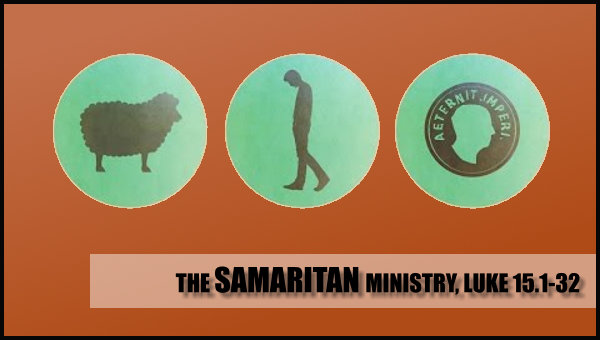By Tyson Thorne

The Samarian Ministry at Various Cities (9.51-18.34), 15.1-32
This section of Luke contains the three most popular parables of Jesus: The Lost Sheep, The Lost Coin and The Prodigal Son. All three make the same point, but with increasing detail, and the point was anything but music to the ears of the religious authorities. When those authorities saw the kind of people who were coming to hear Jesus, people Hillary Clinton might refer to as “deplorables” – sinners and tax collectors – they complained that Jesus welcomed them. They themselves shunned such people, preferring to live in ivory towers among the cities power players. Jesus was about to give them an attitude adjustment.
All three parables have the common themes of losing, finding and rejoicing. Some believe these passages are about believer’s who have fallen away from God and then restored, which makes sense on one level. After all, you can’t lose something you didn’t have in the first place. But context makes it clear that the sheep, the coin and the prodigal son all represent the “sinners” that came to hear Jesus. These people were God’s children only in the sense of their national identity, for they were not living righteously. Clearly then, the “lost” in these parables are unbelievers.
Applying this understanding to the Parable of the Lost Sheep then, the one lost sheep is a “sinner” and the 99 others are the religious leaders. When the one lost sheep is found and enters the fold there is much rejoicing in heaven. In the parable of the lost coin the same applies, only now we learn that the rejoicing occurs in the presence of angels. The coin referred to in the text is a Greek drachma, about one day’s wages. In both parables, the 99 sheep and the 9 other drachmas are all important. Their place should not be diminished, which we see in striking detail in the final parable where they are represented by the prodigal’s older brother.
The story of the Prodigal Son, also sometimes called the Parable of the Compassionate Father, is the longest of the three parables and contains a lot of detail. Many of the details are meant to draw the listeners into the story. Take the prodigals job, for example. After spending his wealth, he became a hired farm hand whose responsibility was to feed pigs -- something that would have been detestable to a Jew. This detail shows just how low the prodigal’s life had sunk. Other details, however, are important to understanding the meaning of the parable.
The youngest son had enjoyed the blessings of the father while under his roof, just as many unbelievers also enjoy common blessings from the Lord. When he decided to live in disobedience to God’s law, however, everything went south. The prodigal started home and while still a long way off, the father spots him and runs to greet him. Often when we turn to God it becomes the moment the has been waiting for. The wayward son is given a robe, a ring, a pair of sandals and a position on the farm he didn’t have before and threw, you guessed it, a banquette. This banquette language would have been familiar to Jesus’ audience and represents God’s Kingdom.
The older brother, as we mentioned, represents the religious leaders. So upset at the way the “sinner” was received, he opted out of attending the banquette. The religious leaders likewise were angered that the kingdom was opened to those who have not spent their lives in supposed service to God. In both cases, the older brother and the religious leaders, the heart is revealed. The older brother’s refusal to enter the banquette mirrors the religious leader’s refusal to enter the Kingdom Jesus was preaching.
For those who think of God as an angry overlord wanting to punish humanity for their every misdeed, these three parables offer a hopeful perspective. Not only does God not want any to perish, he actively seeks out every person in hopes they will become part of his eternal kingdom.
|
|